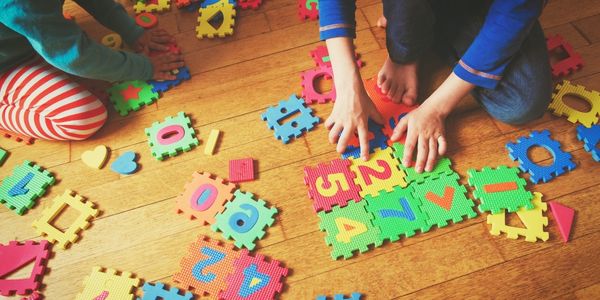
You wince in pain as your unsuspecting foot lands on three almost-impossibly pointy green Legos abandoned in the middle of the floor. The last thing you have time for is the mound of dishes that have once again piled up after family dinner. While you love your kids, you know things would be easier around the house if you weren’t the only one responsible for upkeep.
While it’s obvious you can’t expect a two-year old to mow the lawn, you still could use a little help in determining age-appropriate chores for your kids. You want your kids to become more independent and confident but giving them tasks that are above their abilities doesn’t help anybody—especially if you end up fixing their work.
So what are some of the chores and everyday tasks that make sense for children to do? We spoke to experts in the field of child development to help you determine some of the best age-appropriate chores.
How do chores factor into child development?
“Kids like to feel needed and capable. Chores help with both,” says author and parenting coach Elisabeth Stitt. “They like being able to know they were the one who made the living room sparkle or saw to it that everyone had a sandwich ready for lunch.”
Stitt says that when parents frame chores in terms that make the work an important aspect of family membership (e.g., Saying, “In our family, we help each other”), kids see their work as being an important part of being a family member.
Additional benefits of children doing household chores:
- Empathy: Emmy Kissinger, a licensed school psychologist and blogger, explains that chores help a child develop awareness for the needs of others in the household. If a child has the task of vacuuming, he will be more likely to keep floors clean because he understands the time it takes to clean them.
- Responsibility: Many chores require that a child decide when and how to complete a task which results in practicing responsibility through time management and planning ahead. Dr. Crystal I. Lee, licensed psychologist and owner of LA Concierge Psychologist, emphasizes that responsibility is a “real-world” skill necessary for adults. Chores are developmentally appropriate ways to lead children to independence.
- Self-esteem: Children who are responsible for chores develop a strong self-esteem. Completing chores leads to feeling accomplished and confident about your ability to contribute.
How do I match chores with development?
While you may agree with the importance of children having chores, it can still be challenging to match an age with a specific job. To get started, find the age that interests you, and see what the experts suggest.
Age-appropriate chores for toddlers:
As far as toddlers are concerned, Kissinger says that each duty should help your child strengthen their muscles and encourage basic skill development. Gross motor, fine motor and language skills can be taught through expecting your child to perform low-level household responsibilities.
Kissinger highlights the importance of focusing on skills toddlers normally develop at this time in their lives. Lee encourages simplicity with one or two step tasks. Toddlers will need supervision for all of these chores, and it is most fun for them when they get to complete the chore with the encouragement or help of an adult they care about. Consider the following:
- Feeding a pet
- Picking up toys
- Drying plastic dishes
- Washing themselves in a bath
- Matching pairs of socks in the laundry
- Watering household plants
- Delivering items (wipes for a baby, bottles to the recycling bin, laundry to specific rooms)
Age-appropriate chores for Pre-K/Kindergarten
Now that your toddler has had practice with basic tasks, your little helper is ready to build on this confidence with more complex chores that might include more steps. Stitt says it’s important to include both tasks that this age can complete independently as well as some that require a bit of guidance.
Additionally, Stitt stresses that parents need to put the learning experience over efficiency or quality at this stage of development. While you could probably pour everyone’s drink for dinner in less than a minute without spilling, your kindergartner will most likely require that amount of time for one drink with a few spills—and that’s okay! Schedule times during your day or week when you are ready to be patient and allot more time to these tasks:
- Pouring juice, milk and water
- Sorting toys
- Setting the table, especially with plastic items
- Making the bed
- Measuring and mixing for cooking and baking
- Dusting
- Washing a bike or car
- Ordering a meal at a restaurant
Age-appropriate chores for elementary school age children
More independence begins to come into play with kids as the reach elementary school age. While the previous lists likely required an adult to be present, children in this age range can begin taking on some of these tasks with minimal supervision:
- Self-care (bathing, getting dressed and brushing teeth)
- Making school lunch
- Vacuuming
- Doing the dishes
- Managing school materials (backpacks, homework and books)
- Keeping their rooms clean
- Checking the mail
- Folding laundry
Age-appropriate chores for pre-adolescents
The possibility for autonomy has arrived at this age, and it is also a good time to evaluate the quality of a completed task. Stitt cautions that at this point, chores are likely to be neither fun nor educational as kids will have pretty much mastered the basics. This is typically an age where chores may take additional prodding or incentives to motivate your kids. The pushback might not be fun to deal with, but it’s an important lesson for children to acknowledge and deal with the fact that doing things you don’t like or feel like doing is part of life. The following chores and activities are an excellent starting point:
- Preparing simple meals
- Washing the dishes
- Doing laundry
- Completing yard work (shoveling snow, raking leaves and mowing the lawn)
- Cleaning the bathroom
Age-appropriate chores for teens
For many families, this is the last stage of “childhood.” This is the final opportunity to prepare for adulthood. Dr. Lee acknowledges that cultures and values will play a factor here but says that this developmental period should be spent getting ready for independence outside of the home. These are chores that a teenager should be able to complete independently:
- Planning and preparing meals
- Basic vehicle maintenance (gas, oil changes, changing tires, etc.)
- Organizing schedules (school, friends and extracurricular activities)
- Babysitting
- Managing their money
Setting the foundation
Getting your kids up-to-speed on household chores has obvious practical benefits—we all can use another set of hands to help out with things around the house. But it can go much deeper than that. By doing chores, children learn to empathize, develop a work ethic and learn to value the work they and other family members do as well. Starting early with small habits can help build a foundation of positive traits and behaviors that will benefit kids for life.
Love the idea of helping children grow and develop? You might just make an excellent teacher—after all, parents are the original educators. If you think you’d maybe be interested in making the jump from parent to teacher, learn more about the teacher traits you might already possess in our article, “Teaching Toddlers: 10 Reasons Parents Make Great Teachers
Also check out educational apps for kids.




